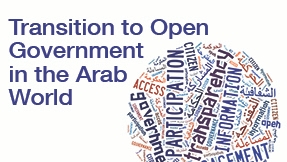Over the past few years, citizens in the Middle East and North Africa region have demanded more open and inclusive governments. Transparency and public engagement are essential pillars of government accountability, which is a fundamental precondition for economic development. In MENA, access to information and public engagement mechanisms are among the weakest in the world. While the current regional context is challenging, international country experience can shed light on lessons learned in the areas of transparency and public engagement, which can prove useful for practitioners in the region undergoing similar reforms.
On October 11, 2013, the World Bank will host a live event to highlight some key reforms in the region, where progress is being made on establishing the foundation for greater access to information and public engagement. Join us as we engage in a lively discussion with government representatives, private sector executives, academics and Bank-Fund staff on this important development agenda.
Submit your questions and comments and join the conversation on October 11, 2013.





